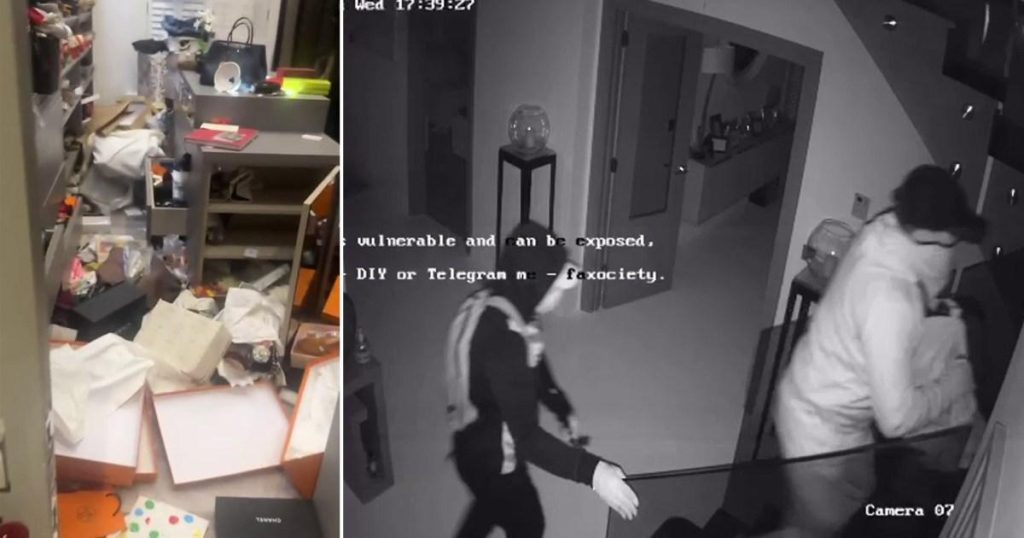The Birch family, residing in a gated community in Surrey, experienced a devastating home invasion shortly after returning from their daughter’s 17th birthday dinner on December 11th. Paul Birch, the founder of the social media platform Bebo, his wife Juliana, and their daughter arrived home to find their mansion ransacked. The thieves, who gained entry by forcing a door with a crowbar, made off with an estimated £500,000 worth of luxury goods. The stolen items included a vast collection of designer handbags from brands like Hermes, Chanel, and Dior, along with high-end jewelry, including a pink and silver Rolex, Tiffany necklaces, and several pairs of Christian Louboutin shoes. Beyond the material loss, the burglars also stole irreplaceable sentimental items, such as the couple’s engraved wedding bands and a set of twelve Mexican gold coins they received as a wedding gift. The scene left behind was one of chaos, with ripped boxes, scattered clothing, and a profound sense of violation for the family.
The aftermath of the burglary has been marked by frustration and anger towards the Surrey Police. Juliana Birch meticulously compiled a detailed list of approximately 200 stolen items for the police, including descriptions and proof of ownership. However, despite the family’s cooperation and the significant value of the stolen goods, the police investigation was abruptly closed after just five weeks. Juliana expressed her outrage at the handling of the case, citing a lack of thorough investigation, including a failure to properly review CCTV footage. She also criticized the investigating officer’s seemingly dismissive attitude and the request for excessive proof of ownership, which she perceived as a lack of belief in her account. The family’s distress was further compounded by the officer’s decision to pause the investigation for his Christmas break, only to inform the family upon his return that the case was closed due to insufficient evidence.
The Birch family’s experience highlights the emotional toll of such a violation. Juliana described the weeks following the burglary as a period of intense fear and anxiety, admitting to carrying a knife around her own home for protection. The lack of progress in the investigation and the ultimate closure of the case without a resolution have only amplified their sense of vulnerability and injustice. The family feels let down by the police, believing that the lack of diligence in pursuing the case sends a message that criminals are prioritized over victims. Juliana expressed her belief that this perceived lack of effort on the part of law enforcement contributes to the success of burglars and other criminals.
The Surrey Police, in their official statement, justified the closure of the case by citing a lack of “positive lines of inquiry.” They indicated that DNA samples collected at the scene did not yield any matches and that the CCTV footage was not clear enough to be processed through the national database. This explanation, however, fails to address the Birch family’s concerns about the thoroughness of the investigation, particularly the perceived lack of attention to available evidence and the seemingly dismissive treatment they received. The discrepancy between the family’s experience and the police’s official statement underscores a breakdown in communication and trust, further compounding the family’s sense of frustration and disillusionment.
This incident underscores the complex and multifaceted nature of burglary. Beyond the financial implications of stolen property, there is the significant emotional impact on the victims, who are left feeling violated and insecure in their own homes. The Birch family’s experience highlights the importance of a sensitive and thorough police response in such cases, not only to recover stolen property but also to provide reassurance and support to the victims. The perceived inadequacy of the police investigation in this instance has only exacerbated the family’s trauma and left them with a lingering sense of injustice. The case also raises broader questions about the effectiveness of law enforcement in addressing property crimes and the potential need for improved communication and empathy in their interactions with victims.
The Birch family’s story serves as a stark reminder of the vulnerability of even those living in seemingly secure environments, like gated communities. It also highlights the limitations of security measures and the need for vigilance. Furthermore, the case brings to light the crucial role of law enforcement in providing support and justice to victims of crime. The perceived shortcomings in the police handling of this case emphasize the importance of accountability and the need for continuous improvement in investigative procedures and victim support services. The Birch family’s experience underscores the lasting impact of such crimes, extending far beyond the immediate loss of property, and highlights the need for a more comprehensive and empathetic approach to investigating and supporting victims of burglary.











